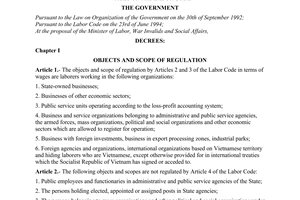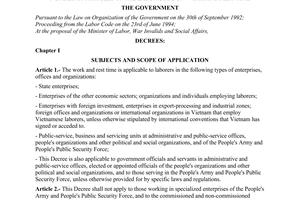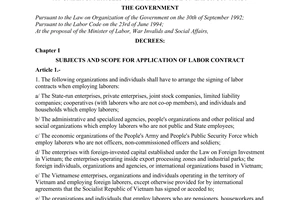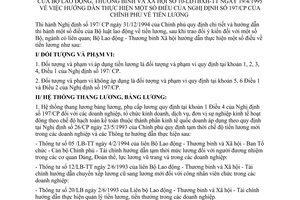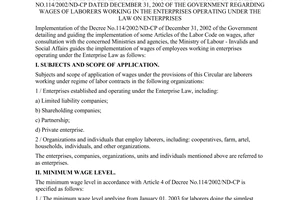Circular No. 10-LDTBXH/TT of April 19, 1995 of the Ministry of Labor, war invalids and social affairs guiding the implementation of a number of Articles of Decree No.197-CP of the Government on wages đã được thay thế bởi Circular No. 13/2003/TT-BLDTBXH of May 30, 2003, guiding the implementation và được áp dụng kể từ ngày 12/07/2003.
Nội dung toàn văn Circular No. 10-LDTBXH/TT of April 19, 1995 of the Ministry of Labor, war invalids and social affairs guiding the implementation of a number of Articles of Decree No.197-CP of the Government on wages
|
THE
MINISTRY OF LABOR, WAR INVALIDS AND SOCIAL AFFAIRS |
SOCIALIST
REPUBLIC OF VIET NAM |
|
No: 10-LDTBXH/TT |
Hanoi, April 19, 1995 |
CIRCULAR
GUIDING THE IMPLEMENTATION OF A NUMBER OF ARTICLES OF DECREE No.197-CP OF THE GOVERNMENT ON WAGES
In execution of Decree No.197-CP on the 31st of December 1994 of the Government providing details and guidance for the implementation of a number of articles of the Labor Code on wages, after consulting with a number of concerned ministries and branches, the Ministry of Labor, War Invalids and Social Affairs provides the following guidance for the application of a number of articles on wages :
I. OBJECTS AND SCOPE OF REGULATION:
1. The objects and scope of the regulation on wages are the objects and scope defined in Items 1, 2, 3, 4 of Article 1 of Decree No.197-CP.
2. The objects and scope of non regulation are the subjects and scope defined in Items 5 and 6 of Article 1, and Article 2 of Decree No.197-CP.
II. SYSTEM OF WAGE SCALES AND WAGE BRACKETS:
1. The system of wage scales, wage brackets and wage subsidies stipulated in Item 1, Article 4 of Decree No.197-CP, concerning the enterprises, business and service organizations, public service and economic units operating according to the system of accountancy and accounting in the State economic sector, shall apply the provisions in Decree No.26-CP on the 23rd of May 1993 of the Government providing for a provisional system of new wages in the enterprises, and the following guiding circulars:
- The inter-ministerial Circular No.5-LB/TT on the 4th of February 1994 of the Ministry of Labor, War Invalids and Social Affairs, the Government Commission on Organization and Personnel and the Ministry of Finance, guiding the temporary payment of wages to the persons in active service in Party agencies, mass and social organizations, the armed forces and enterprises;
- The inter-ministerial Circular No.12-LB/TT on the 2nd of June 1993 of the Ministry of Labor, War Invalids and Social Affairs, and the Ministry of Finance, guiding the conversion of the old wages to the new wages among the workers and personnel in the enterprises;
- The Inter-ministerial Circular No.20-LB/TT on the 2nd of June 1993 of the Ministry of Labor, War Invalids and Social Affairs, and the Ministry of Finance guiding the management of wages and bonuses in the enterprises;
- The inter-ministerial Circular No.21-LB/TT on the 17th of June 1993 of the Ministry of Labor, War Invalids and Social Affairs, and the Ministry of Finance, guiding the classification of enterprises, and the criteria for classification of the enterprises of the ministries and branches issued in line with Circular No.21-LB/TT;
- The inter-ministerial Circular No.28-LB/TT on the 2nd of December 1993 of the Ministry of Labor, War Invalids and Social Affairs, and the Ministry of Finance, providing supplementary guidance for the implementation of the new wage system concerning the workers and personnel in the enterprises;
- Circular No.15-LDTBXH/TT on the 2nd of June 1993 of the Ministry of Labor, War Invalids and Social Affairs, guiding the implementation of the regime of area allowances;
- Circular No.16-LDTBXH/TT on the 2nd of June 1993 of the Ministry of Labor, War Invalids and Social Affairs, guiding the implementation of the regime of incentive allowances.
- Circular No.17-LDTBXH on the 2nd of July 1993 of the Ministry of Labor, War Invalids and Social Affairs guiding the implementation of the responsibility allowances;
- Circular No.19-LDTBXH/TT on the 2nd of July 1993 of the Ministry of Labor, War Invalids and Social Affairs, guiding the implementation of the regime of the traveling allowances;
- Circular No.23-LDTBXH/TT on the 7th of July 1993 of the Ministry of Labor, War Invalids and Social Affairs, guiding the implementation of the regime of noxiousness and danger allowances;
- The inter-ministerial Circular No.24-LB/TT on the 13th of July 1993 of the Ministry of Labor, War Invalids and Social Affairs, the Ministry of Finance, and the General Statistics Department guiding the implementation of the regime of dearness allowances;
- Circular No.29-LDTBXH/TT on the 9th of December 1993 of the Ministry of Labor, War Invalids and Social Affairs, providing supplements to the regime of area allowances.
2. The wage regime in the enterprises, production, business and service organizations belonging to other economic sectors employing 10 and more laborers as stipulated in Item 2, Article 4 of Decree No.197-CP, shall be implemented as follows:
a/ With regard to the enterprises, which have a stable production and business and a level of production equipment and management equivalent to the State enterprises and which are making profits in production and business, shall apply the system of wage scales, wage brackets and wage subsidies of the State for the corresponding branches and occupations.
The State encourages all enterprises to work out and apply a system of wage scales, wage brackets and wage subsidies higher and more beneficial to the laborers.
b/ With regard to the enterprises which are meeting with difficulties in production and business, or which still have a low level of equipment and management, or which are still using a large labor force with low professional and technical skills, they are allowed to work out for themselves their wage scales and wage brackets. However, the lowest wage should not be lower than the minimum wage prescribed by the State. The elaboration of the wage scales and wage brackets must be done in consultation with the local organization of the trade union and recorded in the collective labor accord.
c/ With regard to the laborers who work under seasonal contracts or for specific jobs which require less than three months, or who work in places employing less than 10 laborers, or with regard to houseworkers, the employer shall have to pay, in addition to the wage mutually agreed upon on the principle stipulated in Points a and b, an extra sum equal to at least 17% of the agreed wage, so that the laborer may look after his/her own insurance.
III. REGIME OF PAYMENT OF WAGES AND BONUSES
1. Basing himself on the form of wage payment stipulated in Article 5 of Decree No.197-CP, the employer may choose the form of wage payment, or change the form of payment, to make it conform to the conditions and character of the work and the production organization of the enterprise. But this choice or this change must be written down in the collective labor accord or the labor contract.
2. Payment for overtime work under Items 1 and 2 of Article 8 of Decree 197-CP shall be carried out as follows :
a/ Subjects : This form applies to all categories of subjects, except those who are paid according to the quota-based contracts, piece work or without stable time schedule, such as on the land transport means (including cars), or on water, sea and air routes, or who are paid to buy marine, agricultural products and foods for the State...
b/ Method of calculation of overtime work pay :
- Pay for time-work :
+ 150% of hourly pay of a normal work day, applied to overtime work on normal days.
+ 200% of hourly pay of a normal day applied to the overtime work on weekly rest days or holidays.
In case the laborer is allowed to take his/her time off to compensate for the overtime hours, the employer shall have to pay only the difference representing 50% of the hourly pay of a normal workday if the overtime work takes place in normal days, and 100% if it takes place on the weekly rest days or holidays.
Example 1: The laborer working in standard hours is paid 3,000 VND/hour (including wage and wage subsidies). If he/she works overtime on normal days, he/she is paid 4,500 VND/hour (3,000 VND x 150%). But if he/she has taken his/her time off for compensation, he/she shall be paid only 1,500 VND/hour (4,500 VND/hour - 3,000 VND/hour).
If he/she works overtime on the weekly rest days or holidays, he/she is paid 6,000 VND/hour (3,000 VND x 200%). If he/she takes his time off in compensation, he/she shall be paid only 3,000 VND/hour (6,000 VND/hour - 3,000 VND/hour).
- With regard to the laborer working on a quota basis, after fulfilling his/her norm concerning the volume and quantity of products based on standard hour (the standard hour is defined in Article 3 of Decree No.195-CP), if the employer requires overtime work, the unit price of the product produced outside the standard time shall be increased by 50% if the products are made on normal days, and 100% if the products are made on the weekly rest days or the holidays.
Example 2: The wage unit price of Product A is 1,000 VND/product. In case of overtime work:
- The wage unit price shall be 1,500 VND/product, if the product is made on normal days;
- The wage unit price shall be 2,000 VND/product, if the product is made on the weekly rest days or holidays.
3. The laborer on night shifts under Item 3, Article 8 of Decree No.197-CP shall be paid as follows:
a/ Level of pay:
- The lowest level is 35% of the daytime wage, if the laborer works on night shifts for eight days and more consecutively in a month, irrespective of the form of wage payment.
- The lowest level is 30% of the daytime pay, applied to all other night work, irrespective of the form of wage payment.
b/ Method of calculating extra pay for night work:
- With regard to the laborers who are paid for time-work:
Example 3 : During day-time work, the laborer is paid 2,000 VND/hour (including wage and wage subsidies). If the enterprise organizes night work for less than eight consecutive days in a month, the hourly pay during the night shift is:
2,000 VND/hour + (2,000 VND/hour x 30%) = 2,600 VND/hour
- For the laborers who are paid according to piecework or who receive package pay, if they work in night shifts, the wage unit price shall be increased by at least 30% or 35% over that for daytime work.
Example 4 : Wage unit price on normal days (daytime) of product B is 1,000 VND per unit.
The extra pay per unit for night shifts is:
1,000 VND/unit x 30% = 300 VND/product.
The wage unit price of product B during the night shifts is:
1,000 VND + 300 VND = 1,300 VND/product.
For overtime work during night shifts, the hourly pay is the hourly pay for overtime work in daytime plus extra pay for nightshift work.
Example 5 : The laborer doing overtime work in daytime is paid 4,500 VND/hour (3,000 VND/hour x 150%). If he/she works on night shifts (for the enterprises which organize night shifts for less than eight consecutive days in a month), he/she shall be paid :
4,500 VND/hour + (3,000 VND/hour x 30%) = 5,400 VND/hour
Example 6 : The wage unit of overtime work in daytime of product D is 1,500 VND/product. If the overtime work is done in night shifts, the wage unit shall be:
1,500 VND/product + (1,000 VND/product x 30%) = 1,800 VND/product.
4. The deduction of bonuses from the remaining profits under Article 9 of Decree No.197-CP, shall be effected as follows:
a/ With regard to the enterprises, business and service organizations in the State economic sector:
- Persons eligible for bonuses:
+ Laborers who have worked at the enterprise for one year and longer.
+ Having contributed to the results of production and business of the enterprise.
- Bonus level:
+ For the laborers who have signed labor contracts, the bonus shall not exceed six months' wage agreed in the labor contract.
+ For the workers and employees in the permanent force of the enterprise, who have changed to the labor contract without specification of the term of the contract as stipulated in Decree No.198-CP on the 31st of December 1994 of the Government, the maximum bonus shall not exceed six months' wage according to grade and position or the position allowance, which they are receiving in the system of wage scales and brackets defined by the State in Decree No.26-CP on the 23rd of May 1993 of the Government.
- Bonus regime : The enterprise must work out its bonus regime on the following bases :
+ The efficiency of the laborers' contribution to the enterprise, reflected in the productivity and quality of their work.
+ The time during which the laborers work at the enterprise, those who work longer shall receive larger bonuses.
+ The observance of the regulations and discipline of the enterprise by the laborers.
This bonus regime must be done in consultation with the Executive Committee of the local trade union organization, or the representative of the laborers' collective where no trade union has been founded.
b/ With regard to the private enterprises:
The lowest bonus must represent 10% of the remaining profit of the enterprise. The method of determining the remaining profit of the private enterprise shall be defined by the Ministry of Finance.
The enterprise must elaborate its bonus regime just as in a State-owned enterprise according to Point a in order to pay bonus to its laborers. This regime must be worked out in consultation with the local trade union, or the representative of the laborers' collective where no trade union has been founded.
5. Wage payment during work stoppage under Item 3 of Article 12 of Decree No.197-CP shall be effected as follows:
During a workshift, if the work is stopped for two hours and more, the wage shall be paid for every hour of the stoppage. If the stoppage lasts until the end of the shift, the laborer shall be paid for the whole shift. If the stoppage lasts until the end of a week or a month, he/she will receive his/her weekly or monthly pay for the whole of that week or that month. The wage level paid for work stoppages shall comply with Article 14 of Decree No.197-CP.
IV. OTHER STIPULATIONS
1. The elderly laborers under Article 18 of Decree No.197-CP shall be allowed to work for shorter periods of time while receiving full pay, under these stipulations:
- If he/she is a wage earner by time (day, week or month), he/she shall be paid fully (100%) his/her daily, weekly and monthly wage.
- If he/she receives product pay or package pay, he/she can accept only 50% of the volume of products under contract. If he/she fulfils 50% of the assigned norm, he/she shall receive the same salary as a person (who is not an elderly laborer) who has fulfilled 100% of the norm.
2. The laborers, having a high professional and technical level under Article 20 of Decree No.197-CP, shall receive their wages according to the wage bracket B19- specialist and artisan. The high-level specialists, the high-level economists and high-level engineers shall receive their wages, according to the wage bracket of the specialized, professional and executive labor serving in the enterprises issued together with Decree No.26-CP on the 23rd of May 1993 of the Government.
On the basis of the above wage brackets, the enterprise shall base itself on the effeciciency to determine the income corresponding to the result of the labor of each person.
3. The laborer, who is a Vietnamese citizen working abroad defined in Article 21 of Decree No.197-CP, shall be paid part of his wage in foreign currency or the equivalent in Vietnamese Dong, according to the following regulations:
a/ The pay in foreign currency comprises expenditures on food, clothing and pocket money for the person concerned, in order to ensure the normal living and working conditions for the laborer during his/her working stay abroad.
b/ Principle for calculating the part of the wage in foreign currencies:
- Based on the local cost of living (food, clothing and pocket money for the person working abroad).
- The length of his/her working period abroad.
- The amount of calories spent on the work assigned.
c/ The part of the wage to be paid in foreign currency shall also depend on the concrete wage level of each category of labor, but in any case it must not exceed 60% of the wage level written in the labor contract.
V. IMPLEMENTATION PROVISION
This Circular takes effect on the 1st of January 1995. All the earlier provisions which are contrary to this Circular are now annulled.
In the process of implementation, if any question arises, the ministries, branches and localities are requested to inform the Ministry of Labor, War Invalids and Social Affairs for settlement.
|
THE
MINISTER OF LABOR, |
